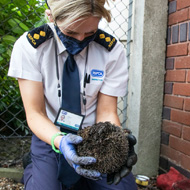RSPCA offers advice on helping hedgehogs

The RSPCA is sharing advice in a bid to keep its national helpline free for emergencies.
The RSPCA is preparing for its annual summer peak in hedgehog calls, with the upcoming heatwave expected to affect hedgehogs' food and water sources.
With August being the busiest month for hedgehog calls, the charity is advising the public to read its online advice on hedgehog care, with tips on keeping hedgehogs safe in the garden and feeding them, in order to take the pressure off of the RSPCA helpline.
Evie Button, scientific officer at the RSPCA, said: “Calls to the RSPCA about sick and injured hedgehogs always peak during August, but this summer’s heatwave could sadly make things even worse, as the little animals’ food and water sources are likely to have been affected in many areas.
“People can help hedgehogs during the heatwave by supplementing their natural diet, leaving out fresh water and foods like tinned dog or cat food and crushed cat or dog biscuits.
“If the hedgehog is very young - roughly apple-sized - you'll need to soak the biscuits in water first. You can also get good quality, meaty hedgehog food from wildlife food suppliers. Check the food and water bowls each day and top them up with fresh water and food and remove any food that hasn't been eaten.
“Never feed hedgehogs milk or bread - milk can cause diarrhoea and bread isn't very nutritious.”
In August 2021, the RSPCA received 1,018 calls about sick, injured or orphaned hedgehogs, and the charity is concerned that the helpline will be too busy to help animals in immediate danger. Because of this, the RSPCA is offering tips on how to help prevent hedgehog injuries.
“We receive more calls about hedgehogs than about almost any other wild mammal. With a total of 6,120 calls taken last year, averaged out, we get about 17 calls a day relating to these iconic and beautiful animals.
“Because we get many calls about injured or trapped animals we have some useful tips to help keep hedgehogs safe in the garden.
“Please remember to remove sports and fruit netting, cover drains and holes, check before using a strimmer or mower, look in compost heaps before forking over and avoid using slug pellets as these are poisonous to hedgehogs.”



 The veterinary mental health charity Vetlife is inviting the veterinary community to join it for a sponsored cold-water dip.
The veterinary mental health charity Vetlife is inviting the veterinary community to join it for a sponsored cold-water dip.